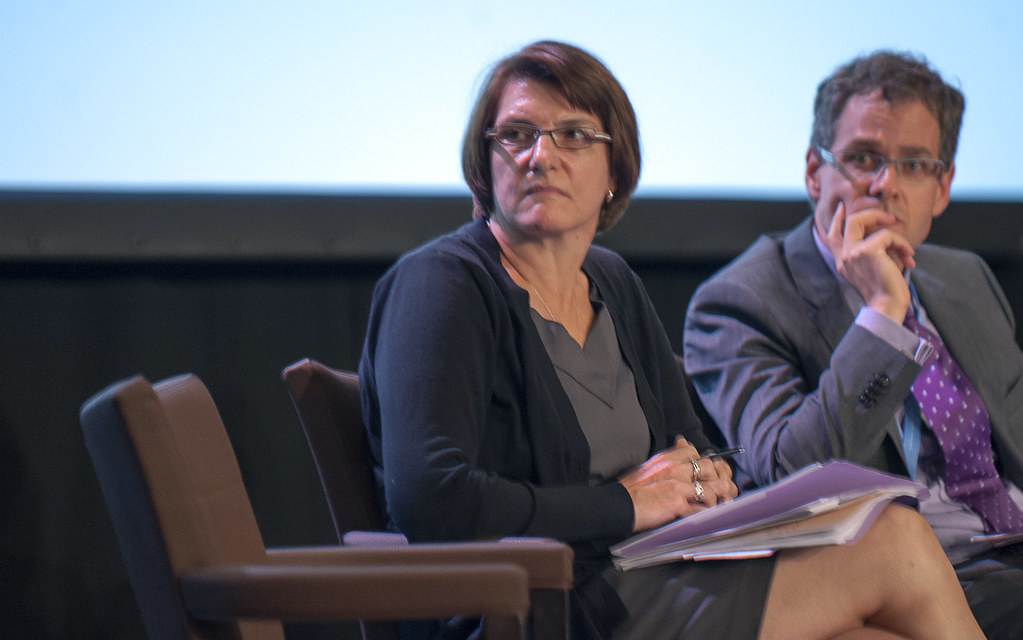The consensus is bipartisan. The vast majority of Americans believe that the monopoly power of tech companies is a major problem for the economy and a corrupting political influence. The right has unashamedly gone after Biden for letting Facebook and Amazon “infiltrate” his administration. And the left has always stood against the consolidation of economic power in the hands of just a few, massive corporations.
The Biden administration should be wary of snubbing this popular mood. It’s not 2008 anymore. We have witnessed the hollowing out of middle America and put labor unions on life support as Amazon’s tentacles ensnare ever greater parts of our supply chains. Unsurprisingly, Biden has already promised to “take a really hard look at” corporate tech monopolies. Embracing the trust-busting zeitgeist by appointing strong, uncaptured antitrust enforcement officials would make good on Biden’s promises, and have significant popular support.
To that end, we’ve compiled a brief list of personnel minefields that Biden should avoid for any antitrust role because of their deep and varied connections to monopolistic industries, and their histories of abusing public sector experience for profit. Note that this is not an all-inclusive or definitive list — individuals with resumes similar to the people below, not just these specific four, should be kept out of the Biden administration.
RENATA HESSE
- As a partner at BigLaw firm Wilson Sonsini, Hesse worked together with Ted Cruz to defend Google against an antitrust suit filed by the state of Texas. If appointed, she would have to recuse herself from the DOJ’s major ongoing antitrust suit against Google. Hesse is a serial revolving-door corporate lawyer who has flitted between the DOJ’s antitrust division and private practice numerous times. She failed to prevent major mergers in the airline, telecom, and healthcare industries despite concerns from consumer and worker advocates. Hesse also aided Intuit, one half of the digital tax services duopoly, when she advised the IRS to restrict its program offering free online tax filing services. Effectively, the only reason you have to hire an accountant, or buy TurboTax (Intuit’s flagship product) is that Hesse and others convinced the IRS to restrict which taxpayers can file taxes online for free. After leaving the DOJ, Hesse joined law firms that advertised their government access and enforcement avoidance expertise, and is currently a partner at Sullivan & Cromwell. Most recently, Hesse was a lead antitrust lawyer for Amazon when it purchased Whole Foods. Unsurprisingly, she pointedly excluded discussions of tech monopolies or e-commerce abuses during her speeches and writings on antitrust enforcement. Hesse has also worked to facilitate multibillion dollar mergers and acquisitions for fintech companies like Kabbage and works at a firm that received an “F” from Law Students For Climate Accountability.
JUAN ARTEAGA
- Arteaga worked in the DOJ’s antitrust division during Obama’s second term as a deputy assistant attorney general. There, he failed to consider the disastrous impact consolidated corporate power would have on organized labor. He failed to stop a merger between American Airlines and US Airways which led to protests by Machinists Union and Transportation Workers Union members who were relegated to “second-class status” post-merger. After leaving the public sector for BigLaw firm Crowell & Moring, he successfully defended AT&T against the DOJ’s challenge to its merger with Time Warner, in a humiliating loss for the Department which further shrunk the media and telecommunications markets. After Arteaga helped secure the merger, the Communications Workers of America accused the companies of reneging on their agreements with organized labor and laying off union workers. In private practice, Arteaga also defended JPMorgan Chase’s collusion to rig the LIBOR exchange benchmark, and defended numerous Wall Street and weapons companies. Notably, Biden’s incoming SEC Chairman Gary Gensler investigated and pursued action against JPMorgan Chase for its LIBOR cartel behavior, meaning two different Biden regulators would have been on opposite sides of a major white-collar crime case, should Arteaga be appointed.
STEVEN SUNSHINE
- Sunshine worked for years in the antitrust enforcement division at the Department of Justice. As deputy assistant attorney general, he allowed hospitals to merge until cities like Manchester, New Hampshire had only one hospital left despite hundreds of thousands of people living in the area. He parlayed his experience inside government into high-powered roles at multiple BigLaw firms, and he now leads the corporate antitrust practice at Skadden Arps. Sunshine sold his knowledge of the inner-workings of the DOJ’s antitrust division to further consolidation in the telecom, pharmaceutical, healthcare, tech, and finance industries. He defended the multibillion-dollar merger of Sprint and T-Mobile against suits from 14 different states which argued the merger would increase prices and harm workers. He helped the pharmaceutical giant Gilead snap up competition. He repeatedly represented Apple in its bids to acquire parts of Intel, and defended Apple in DOJ suits. Sunshine also advised the tip-stealing tech company Doordash on its acquisition of Caviar.
SONIA PFAFFENROTH
- Like others, Pfaffenroth abused the revolving door between antitrust enforcement and the BigLaw firms that defend corporations. She worked her way up in DOJ’s Antitrust division, eventually becoming a deputy assistant attorney general, only to leave four years later to rejoin her old firm Arnold & Porter’s antitrust practice. While at the DOJ. Pfaffenroth failed to stop major mergers like the $107 billion beer merger between Anheuser-Busch InBev and SABMiller and the acquisition of Virgin Airlines by Alaska, leading to further consolidation in the industries. Since returning to Arnold & Porter, she has helped fossil fuel, mining, and pharmaceutical companies evade antitrust enforcement. Her firm advertises its “deep bench” and “strong roster of former senior government enforcers” to clients as a selling point for how they can best evade antitrust regulation.
Photo Credit: “GSR13 – Session: Are Standards the crux of ICT Businesses in Today’s Digital World?” by ITU Pictures is licensed under CC BY 2.0

